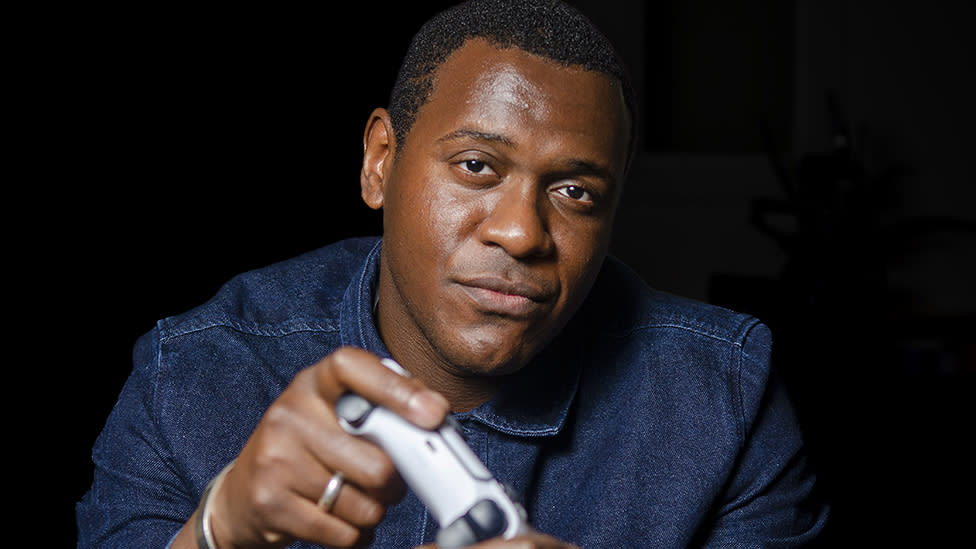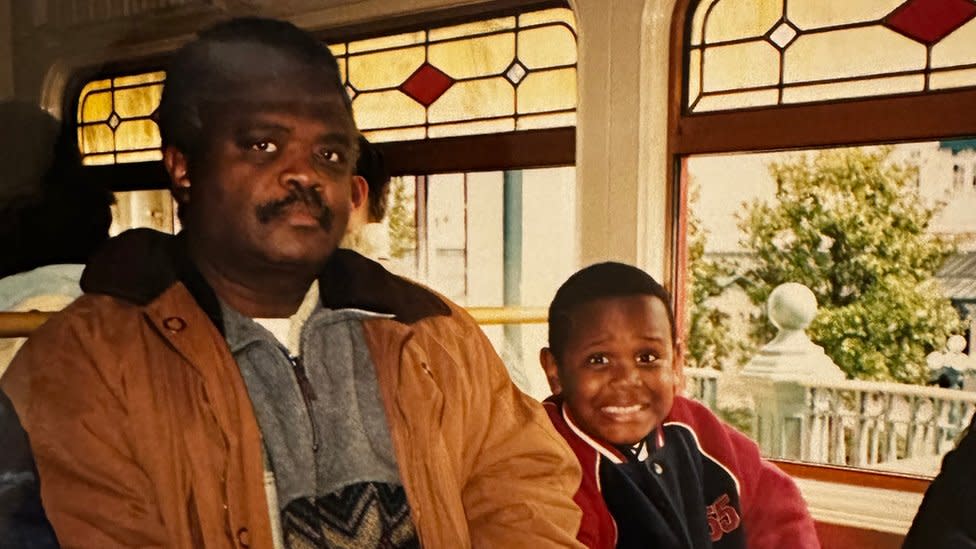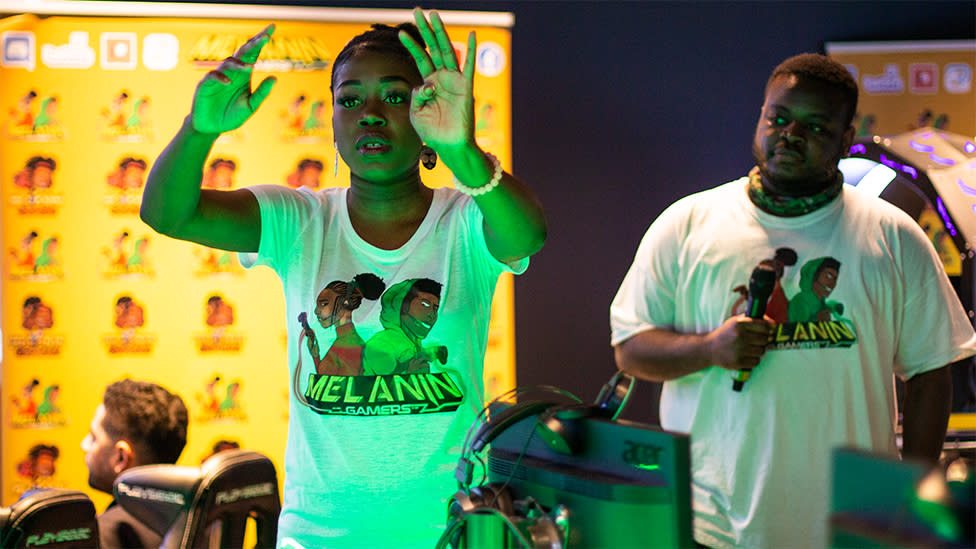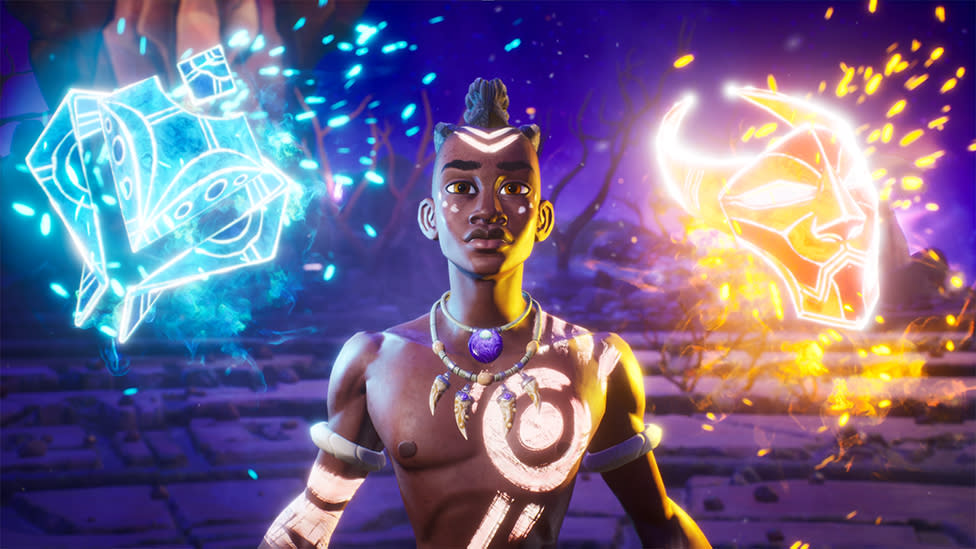Can Tales of Kenzera: Zau unlock a new world of video game stories?

"Every story begins at the end of another."
These are the words that greet players when they boot up Abubakar Salim's debut video game - Tales of Kenzera: Zau.
It's fitting because the British actor, seen in TV series Raised by Wolves and soon to appear in House of the Dragon, is speaking to BBC Newsbeat just days before its big release.
This is the final chapter of Tales of Kenzera's four-year development cycle - a chapter that begins last December, in Los Angeles.
Abu, as he likes to be known, is standing on-stage at The Game Awards, addressing a crowd of 4,000 people in the Peacock Theater. An audience of millions is watching online around the world.
Unveiling Tales of Kenzera, he launches into an emotional speech explaining how the game is inspired by the death of his dad Ali 10 years ago.
Like Abu, the game's title character Zau, a young shaman, has lost his father.
Unable to accept it, he summons the god of death and goes on a quest to bring his dad back to life.
"Truly, at its core, it's about a young boy who's grieving," Abu tells BBC Newsbeat.
His heartfelt reveal strikes a chord with many, and the clip of The Game Awards moment goes viral.
People seen genuinely impressed by the game's trailer, too. Its colourful graphics, stirring orchestral score and setting prompt many to add it to their wishlists.
"The reception has been wild. It's been brilliant, and fantastic," says Abu, who believes the "universal" theme of grief helps his pitch to resonate with gamers.
But for some gamers there's another element, also influenced by Ali and Abu's Kenyan heritage, that gets them excited about the game.

It draws heavily on myths and legends told by the Bantu peoples - hundreds of different groups who live around Africa.
These tales are often passed down, word-of-mouth style, from generation to generation, something Abu experienced first-hand.
"It was really inspired by the stories that my father would tell me as a kid," he says.
"My grandfather was an Nganga, which is like a traditional spiritual healer.
"And so my father would share these really cool worlds and ideas.
"And because the game is about that journey of grief, that kind of connection between me and my dad, it had to exist in the space."
Abu says he chose the setting of Tales of Kenzera, which also gives players the option to play with Swahili dialogue, because it felt like the most authentic way for him to tell his story.
But a high-profile video game with a black main character is a rare thing. And one that draws heavily on African mythology is even more unusual.
So for a lot of gamers seeing Abu on stage stirs up another set of feelings.
"It was amazing to see him up there," says Annabel Ashalley-Anthony. "We don't get to see that very often."
Annabel - the founder of Melanin Gamers, which advocates for more inclusivity in the industry - admits she was already a fan of Abu thanks to his work as main character Bayek in Assassin's Creed: Origins.
But the sight of a black creator at The Game Awards - often referred to as "the Oscars of the industry" - resonated with her.
"For him to debut there was so important, visibly seeing ourselves represented in such a nice way," she says.
"I was like 'this is something that I must play'."

When Abu debuted the game, more than a few people made comparisons between Tales of Kenzera and a certain record-breaking movie.
Annabelle agrees the parallels are there.
"It's definitely the Black Panther of gaming," she says.
Surgent Studios, the development company Abu set up to make the game, has acknowledged the influence of the Marvel hit - both have elements of Afro-futurism, the aesthetic that mixes science-fiction and African culture, and the game's soundtrack features the same choir heard in the movie.
And when Abu revealed the game, he wore a colourful scarf by Nigerian artist Ikiré Jones, whose designs appeared in Black Panther.
The movie is credited with having an impact on representation in Hollywood, and Tales of Kenzera is being published by EA Originals - the indie imprint of the gaming giant behind the EA FC series.
Annabel's brother, Alan, who also runs Melanin Gamers, remembers the "cultural movement" that built up behind the film and thinks that's "opened the floodgates" for games like Zau to come about.
"When it comes to these kinds of projects that come on to the big stage, and blow everybody's shutters wide open, it's like 'oh my gosh, there's a massive potential there, let's capitalise'," he says.
"A lot of people, their first instinct would be Egyptian mythology, and they think that's the only mythology that the African continent has to offer.
"But there is a really massive, untapped market when it comes to African mythology as a whole."

Abu said it was important to him to "honour and respect" Bantu culture as seen in Tales of Kenzera, and "also celebrate it, because you don't really necessarily see a lot of it".
And, for Abu, the end of Zau's development story could be the start of another.
He's hoping to turn Tales of Kenzera into a full-blown franchise, with film, TV and comic spin-offs.
"Even though you're building this really cool world, not everyone's going to be playing the game," he says.
"If I can get my mum to, for example, watch the TV show, I can then at least talk to her about the game and find the connections there. And I quite like that.
"And also it's a great way of inspiring other writers and other creatives to tell stories within that universe or even create their own universe."

Listen to Newsbeat live at 12:45 and 17:45 weekdays - or listen back here.
